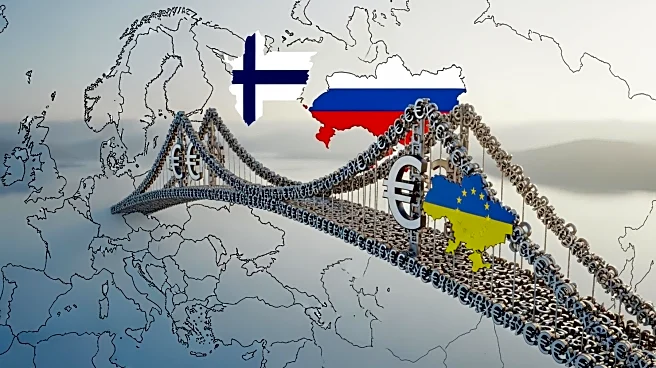What's Happening?
Finnish President Alexander Stubb has proposed a significant economic measure aimed at pressuring Russia to negotiate peace with Ukraine. The proposal involves transferring €200 billion in frozen Russian assets to Ukraine as a loan. If Russia fails to pay
reparations following peace talks, these funds would remain with Ukraine. Stubb emphasized the dire state of the Russian economy, noting that its growth is nearly stagnant and inflation is between 10-20%. He urged Western nations to apply maximum economic pressure on Russia, suggesting that such measures could compel the Kremlin to engage in peace negotiations. Additionally, Stubb called for a complete cessation of Russian oil and gas exports to Europe, warning that countries continuing to purchase these resources could face sanctions.
Why It's Important?
This proposal by Finland underscores the strategic use of economic leverage in international diplomacy, particularly in conflict resolution. By targeting Russia's financial assets, the initiative aims to weaken its economic stability, potentially forcing a shift in its stance on the Ukraine conflict. The move also highlights the broader geopolitical dynamics at play, with Europe and the U.S. playing pivotal roles in supporting Ukraine. The potential transfer of assets could significantly bolster Ukraine's financial position, providing it with resources to sustain its defense and recovery efforts. The proposal also reflects the growing unity among European nations in countering Russian aggression, with Finland and Sweden's recent NATO membership further strengthening the alliance.
What's Next?
The proposal is likely to prompt discussions among European and U.S. leaders regarding the feasibility and implications of such a significant asset transfer. The response from Russia will be closely watched, as it could influence the Kremlin's approach to the ongoing conflict. Additionally, the potential for increased sanctions on countries purchasing Russian oil and gas could lead to shifts in energy markets and international trade relations. The role of the U.S. remains crucial, particularly in providing air defense and intelligence support to Ukraine, as emphasized by President Stubb.
Beyond the Headlines
The proposal raises important questions about the ethical and legal dimensions of using frozen assets in international conflicts. It also highlights the potential long-term shifts in global energy markets, as European countries seek to reduce dependency on Russian resources. The initiative could set a precedent for how economic tools are used in geopolitical conflicts, influencing future diplomatic strategies.

















